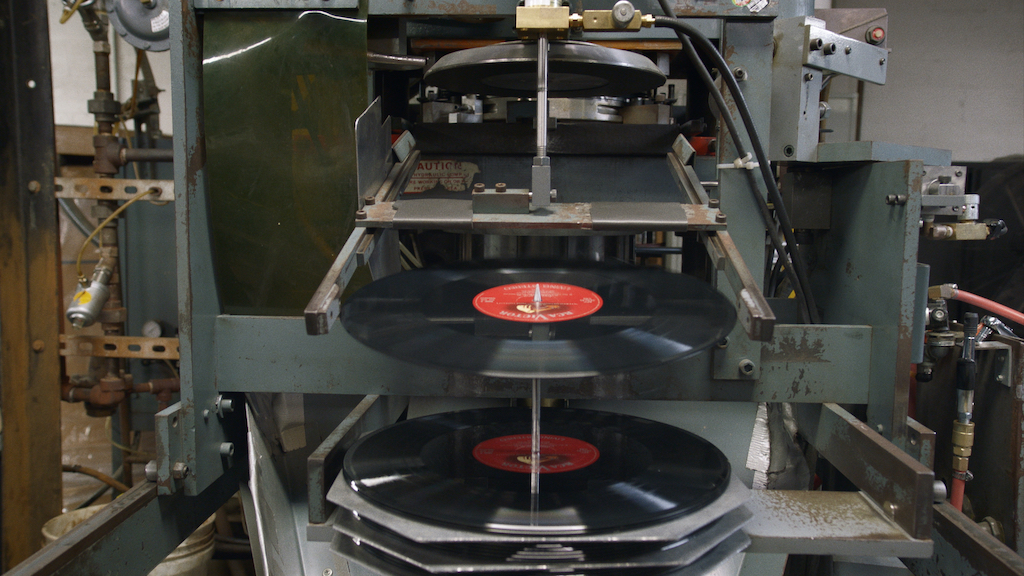
People who love records really love records—and no CD, MP3, or streaming service will ever change that. Directors Kevin Smokler and Christopher Boone—who both went to Johns Hopkins and lived in Baltimore for a while (Kevin even worked at the late, great video store, Video Americain)—explore that passion. Owning vinyl is a lifestyle—from the retro (or retro-inspired) record players, to the artwork on the covers and liner notes, to the way records can be displayed in the home and flipped through in the stacks. Most of the record geeks that Smokler and Boone interview can’t completely articulate why they love records so much—it’s partly the objectness of them, the way you can physically hold the record in your hands; it’s partly the nostalgia associated with them (although in some cases it’s second-hand nostalgia; many record devotees were too young for the real thing); and partly, it’s the headiness of belonging to an exclusive society of like-minded people.
The record, as the film notes, has evolved over the years. First, it was the only way for music to be mass produced, purchased, and brought into people’s homes. Then, slowly but surely, things conspired to kill the industry—tapes, Sony Walkmen, CDs, MP3s, and now streaming services. Records always had their hardcore devotees—many who claim that the analog music just sounds better, albeit in a way that’s hard to articulate (the film has some fun exploring that question). But at some point, records were only for a very select, elite, mostly white, mostly male group.
What has happened in the last decade or so is that the love of records has expanded—and democratized. More young people, more women, more people of color are getting into the craze. It’s hard to pin-point exactly why—but it seems part and parcel of the whole DIY culture that has sprung up in recent years. It doesn’t hurt that Urban Outfitters, that youth streetwear and lifestyle brand, started selling very snazzy retro Crosley record players several years back. Another big thing, the film points out, is the creation of Record Store Day, which has become a holiday of sorts, where record stores play live music, offer exclusive items, and encourage a kind of in-store party. (Record store owners are a “community of people who are very similar to their customers,” one owner notes.) Bryan Burkert, of Fells Point’s famous Sound Garden Records, is one of the record store owners interviewed in the film and the concept of Record Store Day was actually birthed by him and others right here in Baltimore.
Vinyl Nation is clearly a work of passion—not just on the part of its subjects (various vinyl devotees, DJs, record store owners, record pressers, and the like), but of its filmmakers, who interview dozens and dozens of people and dive deeply and enthusiastically into every minute aspect of the record-collecting world.
My favorite part of the film was seeing the people talk about their collections. For one, they all tend to have great personal aesthetics; a huge part of record collecting is the fact that your taste (both in music and in visuals) can be displayed, much like a bookshelf—and lots of the album art is just straight-up cool.
The film maybe got a little too deep in the weeds when we spent time at more than one record making plant—this, perhaps was where my level of interest slightly deviated from the filmmakers’. But still, it’s a whole lot of fun to see people who love not just music but their stuff so much. One of the film’s subjects, a teal-haired DJ, actually cries when she contemplates what will happen to her collection after she dies. A pint-sized record connoisseur, no older than 12, notes that his friends at school have immature taste in music (he likes Bowie). All the subjects discuss the convivial, communal nature of record collecting; the comforting, life-affirming sense of finding your people. Which is why records—and the people who love them—are here to stay.
Vinyl Nation is available to stream through the Parkway Theatre as well as the Charles and Senator theaters.
